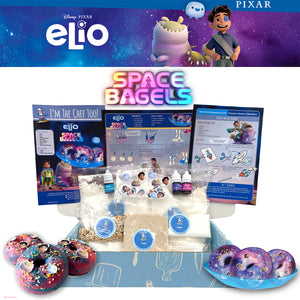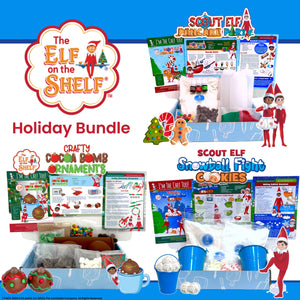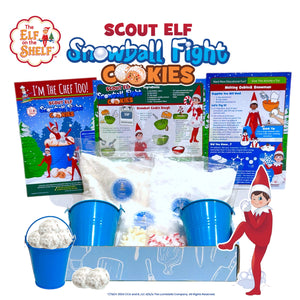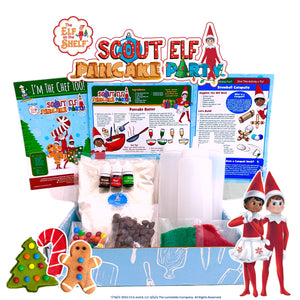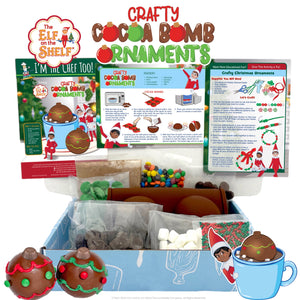Baking Adventures: Unforgettable Fun Baking Recipes for Kids

Table of Contents
- Introduction
- Why Baking is More Than Just Mixing Ingredients
- Preparing for Your Baking Expedition: Setting the Stage for Success
- Our Top Picks for Fun Baking Recipes for Kids: Categories & Examples
- Integrating STEM & Art: Our I'm the Chef Too! Approach
- Tips for a Smooth & Joyful Baking Session
- Beyond the Home Kitchen: Group Baking Adventures
- The Lasting Legacy of Baking Memories
- Conclusion
Introduction
Picture this: a Saturday morning, the aroma of warm vanilla and melting chocolate wafting through the air, laughter echoing from the kitchen, and tiny hands eagerly covered in flour. For many parents, this idyllic scene might feel like a distant dream amidst the constant pull of screens and the demands of modern life. Yet, the kitchen, with its endless possibilities for creation and discovery, offers a truly magical escape. It's a place where children aren't just consumers of content, but active creators, explorers, and budding scientists.
In a world increasingly dominated by digital distractions, finding engaging, educational, and genuinely fun activities for children can be a challenge. That's where the timeless joy of baking comes in, transforming everyday ingredients into an exciting learning adventure. At I'm the Chef Too!, we believe that the kitchen is the ultimate classroom. Our mission is to blend food, STEM (Science, Technology, Engineering, and Math), and the arts into one-of-a-kind "edutainment" experiences that spark curiosity and creativity in children. This post will explore how embracing fun baking recipes for kids can facilitate family bonding, provide a much-needed screen-free alternative, and, most importantly, turn your kitchen into a vibrant hub of discovery and deliciousness.
Why Baking is More Than Just Mixing Ingredients
Baking with kids isn't just about the delicious treats at the end; it's a rich, multi-sensory journey packed with invaluable life lessons and cognitive development. It’s an activity that naturally weaves together various disciplines, making complex subjects accessible and exciting.
The Magic of Transformation
There's something inherently captivating about watching disparate ingredients—flour, sugar, eggs, butter—come together and transform through heat and chemistry into a cake, a cookie, or a loaf of bread. For a child, this transformation is nothing short of magic. It cultivates a sense of wonder and shows them that they have the power to create something tangible and delightful from scratch. This hands-on process, from raw materials to finished product, provides a concrete understanding of cause and effect that is often missing in abstract learning environments.
Beyond the Recipe Book: Life Skills in the Kitchen
Every step in a baking recipe offers an opportunity to build essential life skills. These aren't just theoretical concepts but practical abilities that children will carry with them for a lifetime.
- Following Instructions & Sequencing: Baking is a step-by-step process. Children learn the importance of order and precision. Miss a step, or do it out of sequence, and the results might not be what you expect! This teaches them the value of carefully reading and understanding directions, a critical skill for school and beyond.
- Patience & Perseverance: Dough needs to rise, cakes need to bake, and cookies need to cool. Baking teaches patience, demonstrating that good things come to those who wait. When a recipe doesn’t turn out perfectly, it offers a chance to persevere, problem-solve, and try again, building resilience.
- Problem-Solving & Adaptability: What if you’re out of vanilla extract? Can you substitute? What if the dough is too sticky? Baking often presents small challenges that encourage creative thinking and adaptability. It’s a low-stakes environment to practice finding solutions.
- Fine Motor Skills & Hand-Eye Coordination: From cracking an egg to stirring batter, kneading dough, or decorating a cookie, baking activities refine fine motor skills and improve hand-eye coordination. These are foundational for writing, drawing, and many other daily tasks.
- Responsibility & Independence: Giving children age-appropriate tasks fosters a sense of responsibility. They learn to clean up their workspace, care for ingredients, and contribute to a shared goal. This builds confidence and moves them towards greater independence in the kitchen and in life.
- Teamwork & Communication: Baking together is a fantastic way to practice teamwork. Children learn to share tasks, communicate needs ("Can you pass the sugar?"), and cooperate towards a common delicious outcome. It strengthens family bonds through shared effort and conversation.
A Feast for the Mind: STEM & Art in Every Bite
At I'm the Chef Too!, we uniquely emphasize how baking is a natural incubator for STEM and art education. Our approach is designed to make these complex subjects tangible and exciting, turning every recipe into a learning adventure.
-
Science (Chemistry & Physics): The kitchen is a living laboratory!
- Chemical Reactions: Why do cakes rise? It's the magic of baking soda and baking powder reacting with liquids and heat, producing carbon dioxide gas. You can see this in action when making our Erupting Volcano Cakes, where a "lava" of deliciousness bubbles over, demonstrating a fascinating chemical reaction.
- States of Matter: Observe butter melting from solid to liquid, or how water turns to steam in the oven.
- Heat Transfer: How does an oven cook food? What happens to sugar when it caramelizes? These are all physics in action.
- Emulsification: How oil and water (like in mayonnaise or some batters) mix together when they usually don't.
- Technology (Tools & Techniques): Understanding and safely using kitchen tools—measuring cups, spoons, mixers, whisks, and ovens—is a practical application of technology. Children learn about their functions and how they make baking more efficient.
- Engineering (Design & Structure): Building a gingerbread house, stacking cake layers, or even just shaping cookies involves basic engineering principles. How do you make something stable? How do you design for a specific outcome? These are questions engineers ask, and bakers answer!
-
Math (Measurement & Fractions): Baking is inherently mathematical.
- Measurement: Learning to accurately measure ingredients (cups, teaspoons, grams) is a direct application of measurement skills.
- Fractions: Understanding that half a cup is less than a whole, or that two quarter cups make a half, is fundamental to baking and reinforces abstract math concepts in a concrete way.
- Counting: Simple counting of eggs, scoops, or sprinkles.
- Ratios & Proportions: Doubling or halving a recipe introduces the concept of scaling and ratios.
-
Art (Creativity & Expression): Once the baking is done, the decorating begins! This is where the artistic side truly shines.
- Color Theory: Choosing frosting colors and sprinkle combinations.
- Design & Composition: Arranging decorations, creating patterns, or telling a story through edible art.
- Presentation: Learning how to plate or display their creations beautifully.
- This creative outlet allows children to express themselves, fostering imagination and aesthetic appreciation.
Family Bonding & Screen-Free Fun
In our busy lives, dedicated family time can be scarce. Baking offers a perfect opportunity to slow down, connect, and make memories together. It’s a screen-free zone where conversations flow naturally, stories are shared, and laughter is plentiful. The shared experience of creating something delicious, from start to finish, builds strong bonds and traditions that children will cherish for years to come. It’s a tangible way to show love and spend quality time, far removed from the digital world.
Preparing for Your Baking Expedition: Setting the Stage for Success
Before you dive into the delicious world of baking with your kids, a little preparation goes a long way. Setting the right environment can turn potential chaos into a joyful, manageable experience.
Safety First, Always
This is paramount. Adult supervision is always required when children are in the kitchen, especially when ovens, hot liquids, or sharp tools are involved.
- Oven Safety: Teach children about oven mitts, always having an adult open and close the oven, and never touching hot surfaces.
- Knife Skills: Depending on age, start with plastic knives for softer ingredients, graduating to butter knives, and eventually, with close supervision, small paring knives for older children. Focus on proper grip and cutting techniques.
- Appliance Use: Supervise the use of stand mixers, hand mixers, and blenders. Teach them about turning off appliances before scraping bowls or touching blades.
- Handwashing: Emphasize washing hands frequently, especially before touching food and after handling raw ingredients like eggs.
Kid-Friendly Kitchen Setup
Make your kitchen inviting and accessible for little helpers.
- Designated Workspace: Clear a counter space at their height (or use a sturdy stool/tower) where they can comfortably reach and participate.
- Accessible Tools: Keep kid-friendly measuring cups, spatulas, and mixing bowls within easy reach. Small, colorful tools can make the process more appealing.
- Aprons: Not just for cleanliness, aprons make kids feel like real chefs, adding to the fun!
Choosing the Right Recipe: Age & Skill Level Matters
Selecting an age-appropriate recipe is crucial for success and maintaining enthusiasm. It’s better to start simple and build up skills gradually.
-
Toddlers (1-3 years): Focus on sensory experiences and simple actions.
- Tasks: Pouring pre-measured ingredients, stirring with a large spoon, mashing soft fruits (like bananas for banana bread), sprinkling decorations, washing fruits/vegetables.
- Recipes: Simple muffins, no-bake energy balls, fruit salads, basic cookie dough (for pressing with cutters).
-
Preschoolers (3-5 years): They can handle more defined tasks with clear steps.
- Tasks: Scooping ingredients with measuring cups, kneading dough, rolling out dough with a small rolling pin, simple decorating with sprinkles or pre-made frosting, whisking eggs (in a large bowl to prevent spills).
- Recipes: Simple cookies (sugar cookies for decorating), basic cupcakes, fruit tarts, easy bread rolls.
-
Early Elementary (6-8 years): They can start reading simple recipes and understanding sequences.
- Tasks: Reading recipe steps aloud, cracking eggs (into a separate bowl first!), using a hand mixer with supervision, greasing pans, cutting soft ingredients with a butter knife or kid-safe knife.
- Recipes: Pancakes, easy brownies, simple cakes, basic bread recipes (like soda bread), more complex cookie decorating.
-
Older Kids (9+ years): With more independence and fine motor control, they can tackle more advanced techniques.
- Tasks: Measuring precisely, separating eggs, creaming butter and sugar, using a stand mixer independently, basic knife skills (with supervision), following multi-step recipes, troubleshooting.
- Recipes: Yeast breads, pies, more intricate cakes, homemade pastries, challenging cookie recipes.
Managing Expectations (for Parents & Kids)
This is perhaps the most important tip. Baking with kids will be messy, and it won't always be perfect.
- Embrace the Process: The goal isn't a bakery-perfect result, but the joy of the shared experience and the learning that takes place. Let go of perfectionism.
- Messes Happen: Flour will fly, spills will occur. Have cleaning supplies ready and view it as part of the fun. An apron for your child (and maybe you!) is a good idea.
- It Takes Longer: Everything takes longer with little helpers. Plan extra time and don't rush the process.
- It's Their Creation: Allow them creative freedom, even if it means unconventional color choices or an abundance of sprinkles. Celebrate their effort and pride.
Gathering Your Crew & Supplies
Before you start, do a quick inventory.
- Read the Recipe: Go through the entire recipe beforehand to ensure you have all ingredients and equipment.
- Pre-Measure (Optional but Recommended): For younger children, pre-measuring some ingredients into small bowls can reduce mess and frustration, allowing them to focus on pouring and mixing.
- Enthusiasm: Bring your positive attitude! Your excitement is contagious and will set the tone for a fun experience.
Our Solution for Simplicity
We understand that busy schedules and the thought of gathering ingredients can sometimes be a barrier to starting a baking adventure. That's why at I'm the Chef Too!, we make it easy. Our unique kits come with pre-measured dry ingredients and specialty supplies, reducing prep time and ensuring you have everything you need for a complete experience right out of the box. Not ready to subscribe? Explore our full library of adventure kits available for a single purchase in our shop. Find the perfect theme for your little learner by Browse our complete collection of one-time kits.
Our Top Picks for Fun Baking Recipes for Kids: Categories & Examples
Now, let's talk about some truly fun baking recipes for kids that are perfect for sparking joy and learning in your kitchen. We've categorized them to help you find the perfect fit for your family's next culinary adventure.
Muffin & Cupcake Magic (Quick Wins & Customization)
Muffins and cupcakes are often considered the gateway to baking for kids, and for good reason! They're quick to make, quick to bake, and come in individually portioned sizes, making them perfect for little hands and eager appetites.
- Why they're great: Their relatively short baking time means less waiting for impatient young bakers. They are also incredibly versatile, allowing for endless customization with different fruits, chocolate chips, or spices. The individual portions are excellent for teaching portion control and sharing.
- Concepts: Kids learn about leavening agents (how baking soda/powder makes them rise), the importance of not overmixing (for tender muffins), and the concept of 'mise en place' (having all ingredients ready before mixing).
-
Ideas:
- Banana Muffins: A classic, great for using up overripe bananas. Kids love mashing the bananas and stirring in chocolate chips.
- Apple Cinnamon Baked Oatmeal Cups: A healthier option that can be a grab-and-go breakfast. Kids can help measure oats, applesauce, and cinnamon.
- Mini Pumpkin Muffins: Perfect for fall or any time of year. Little ones can sprinkle in the pumpkin spice or chocolate chips.
- Basic Vanilla/Chocolate Cupcakes for Decorating: The real fun here is the decorating! Once baked and cooled, these become a canvas for sprinkles, frosting, and edible art.
- Example Integration: Imagine your little one learning about chemical reactions while making "super-rise" muffins, observing how the batter magically puffs up in the oven. This visible transformation provides an exciting introduction to the science of baking.
Cookie Creations (Creativity & Fine Motor Skills)
Cookies are another universally loved baking project. The process of making and decorating cookies offers a fantastic blend of sensory play, fine motor skill development, and creative expression.
- Why they're great: Dough handling is a wonderfully tactile experience. Rolling, cutting shapes, and decorating provide ample opportunities for developing fine motor skills and hand-eye coordination.
- Concepts: Kids learn about dough consistency, how heat changes the texture of ingredients, and basic geometry through cookie cutters.
-
Ideas:
- Sugar Cookies (with Decorating Focus): These are a blank canvas! Kids can roll out the dough, use cookie cutters of various shapes (animals, stars, hearts), and then go wild with frosting, sprinkles, and edible glitter. This is where their artistic flair truly comes alive.
- Chocolate Chip Cookies (Giant or Mini): Whether you make a batch of classic cookies or one giant "cookie cake," the appeal of chocolate chips is undeniable. Kids can help measure, mix, and drop spoonfuls of dough.
- Mini M&M Cookies: Adorably tiny and perfectly pop-able, kids love shaping these cookies that fit perfectly in the palm of their hands.
- No-Bake Cookies: For instant gratification and less heat, these are fantastic. Think peanut butter chocolate no-bake cookies or classic no-bake oatmeal cookies. They teach simple mixing and chilling.
- Example Integration: Our kits often feature cookie decorating as a canvas for edible art, encouraging kids to experiment with colors and patterns, much like an artist with a paintbrush.
"Edible Science Experiments" (Sparking Curiosity)
Some baking recipes are practically science experiments in disguise, offering exciting visual and tactile demonstrations of chemical principles. These are particularly great for sparking a child's natural curiosity about how things work.
- Why they're great: They often involve dramatic, visible reactions that captivate children and make scientific concepts memorable.
- Concepts: Kids directly observe acids and bases reacting, gas production (carbon dioxide from yeast or baking soda), and phase changes (liquids becoming solids).
-
Ideas:
- Erupting Volcano Cakes: This is a perfect example of chemistry in action. Imagine the thrill as your child watches a "volcano" erupt with delicious, edible lava, all while learning about chemical reactions. For an experience that truly blends science and deliciousness, try our Erupting Volcano Cakes kit! It's a fantastic way to introduce concepts like acids and bases in a fun, tangible way.
- Soft Pretzels (Yeast Activation): Working with yeast introduces the concept of living organisms and fermentation. Kids can observe the yeast "waking up" and making the dough rise, then enjoy shaping the pretzels. The short rise time makes it manageable for young bakers.
- No-Yeast Soda Bread: This quick bread demonstrates the power of baking soda and buttermilk (an acid) to create lift without yeast, offering a different chemical reaction to observe.
- Chocolate Lava Cakes: The molten center of these cakes is a result of precise baking time and heat transfer, a delicious demonstration of how temperature affects ingredients.
- Example Integration: We believe in hands-on, tangible learning, and kits like our Erupting Volcano Cakes perfectly embody this, turning a science lesson into a delicious adventure.
"Travel the World" Through Bread & Savory Bakes (Cultural & Practical Skills)
Baking isn't just about sweets! Exploring savory recipes and different types of bread can broaden a child's palate and introduce them to new cultures, while still building essential baking skills.
- Why they're great: They introduce new flavors and textures, expand cooking repertoire beyond desserts, and develop fundamental dough-handling skills that apply to many cuisines.
- Concepts: Kids learn about gluten development (kneading dough), the role of fermentation (in yeast breads), and the balance of savory flavors.
-
Ideas:
- Homemade Pizza Dough: A fantastic project where kids can knead the dough, then get creative with toppings. It’s an engineering challenge to make the perfect crust!
- Homemade Cheese Crackers: Making your own crispy, salty, cheesy crackers is surprisingly simple. Kids can help mix the dough and use cookie cutters to make fun shapes. It’s a great snack to enjoy after their hard work.
- Soft Pretzel Bites: Easier than full pretzels, these are great for yeast beginners. Kids love shaping the dough into little bites, and the boiling step before baking is a unique experience.
- Homemade Ham & Cheese Pockets: Made with a simple pizza dough, these are versatile and freezer-friendly, great for snacks or quick meals. Kids can help with rolling and filling.
- Buttermilk Biscuits: Learning to make flaky biscuits from scratch with just a few ingredients teaches about cold butter and quick mixing, resulting in hundreds of flaky layers. Kids love cutting out the biscuit shapes.
"Celestial Sweets" & Themed Treats (Imagination & Storytelling)
Connecting baking to broader interests, like space, animals, or favorite characters, makes the activity even more engaging and memorable. These recipes turn a simple bake into a storytelling experience.
- Why they're great: They leverage children's existing interests, making the learning feel less like a chore and more like play. They encourage imaginative play and creative problem-solving.
- Concepts: These projects often involve elements of astronomy, geology, character design, and narrative creation.
-
Ideas:
- Galaxy Donut Kit: This is a perfect example of blending baking with astronomy. Kids can create their own edible solar system, learning about planets and galaxies while decorating delicious treats. Explore astronomy by creating your own edible solar system with our Galaxy Donut Kit.
- Dirt Pudding: Layers of chocolate pudding, crushed cookies, and gummy worms create a whimsical "dirt" dessert. It's a fun way to talk about layers in the earth or even the concept of ecosystems.
- Peppa Pig Muddy Puddle Cookie Pies: Even beloved characters can make learning fun! Kids can create these delightful treats, imagining Peppa Pig's adventures. This connects baking to storytelling and character play. Even beloved characters can make learning fun, like when kids make Peppa Pig Muddy Puddle Cookie Pies.
- Mini Animal Cracker Cookies: By adding a dash of cinnamon to a sugar cookie recipe, kids can make adorable mini animal cracker cookies. Dunking them in icing and sprinkling are perfect tasks for young bakers, connecting to animal themes.
No-Bake Wonders (Instant Gratification & Less Heat)
For days when you need a quick activity, or prefer to minimize oven use, no-bake recipes are a fantastic choice. They offer immediate gratification and are often simpler, making them ideal for younger children or those just starting their baking journey.
- Why they're great: Minimal or no heat required, quick assembly, and often faster results. They build confidence with less risk.
- Concepts: Chilling as a setting agent, simple mixing, layering, and assembly.
-
Ideas:
- Puppy Chow (Muddy Buddies): Made from simple ingredients like Chex cereal, chocolate, and powdered sugar, this is a quick, irresistible treat. There's no baking involved, so it's a great after-school project to make together.
- S'mores Icebox Cake: Layers of graham crackers, chocolate pudding, and marshmallow cream come together for a delicious dessert that just needs chilling.
- Chocolate Peanut Butter No-Bake Cookies: These classic cookies involve cooking sugar and butter on the stovetop (adult step!), then mixing with oats and peanut butter before dropping and chilling. Quick and decadent.
- Candy Corn Pretzel Hugs: An easy 3-ingredient recipe that involves melting chocolate on pretzels with candy corn (or M&Ms) for a salty-sweet treat. Simple assembly and quick setting.
Integrating STEM & Art: Our I'm the Chef Too! Approach
At I'm the Chef Too!, our core philosophy is to go beyond just providing recipes. We are dedicated to transforming the act of baking into a holistic learning experience that nurtures young minds and fosters a lifelong love of discovery.
Our Mission in Action
Our mission is to seamlessly blend food, STEM, and the arts into unique "edutainment" experiences. We believe that children learn best when they are actively engaged, and what could be more engaging than creating something delicious they can then enjoy? Every kit we design is thoughtfully crafted to demonstrate scientific principles, encourage mathematical thinking, inspire engineering design, and unleash artistic creativity, all through the fun of cooking.
The "Edutainment" Difference
We call our approach "edutainment" because it's about learning without even realizing it. Children are so immersed in the hands-on fun of mixing, measuring, and decorating that they absorb complex concepts naturally. They don't feel like they're doing "schoolwork"; they feel like they're playing and creating. This joyful engagement is key to sparking curiosity and building a positive association with learning.
Developed by Moms & Educators
Our unique approach comes from a place of deep understanding of both children's developmental needs and effective educational strategies. Our kits are developed by mothers and educators who understand the challenges parents face and how to create activities that are both fun and genuinely enriching. This expertise ensures that each baking adventure is not only safe and enjoyable but also aligns with educational principles, subtly teaching critical thinking and problem-solving skills.
Hands-On, Tangible Learning
We emphasize tangible, hands-on experiences because children learn best by doing. Instead of just reading about chemical reactions, they witness them firsthand as their cakes rise. Instead of abstract math problems, they physically measure ingredients and understand fractions. This concrete interaction with materials and processes helps solidify understanding and makes learning more meaningful and memorable. Our kits provide all the necessary components for these tactile learning moments.
Convenience & Value of Our Kits
We understand that life is busy. That's why our kits are designed for maximum convenience and value. Each box is a complete experience, containing pre-measured dry ingredients and specialty supplies, saving you trips to the grocery store and reducing prep time. This allows families to dive straight into the fun and learning without the hassle.
Ready for a new adventure every month? Join The Chef's Club and enjoy free shipping on every box. It’s the perfect way to bring ongoing educational fun right to your door.
Tips for a Smooth & Joyful Baking Session
Even with the most fun baking recipes for kids, the experience can sometimes feel overwhelming. These practical tips, born from years of experience by mothers and educators, can help ensure your baking sessions are joyful and relatively smooth.
Embrace the Mess (and how to minimize it)
Mess is an inevitable part of baking with kids, but it's also part of the fun!
- Aprons: Get everyone an apron! It protects clothes and adds to the "chef" experience.
- Designated Space: Confine the mess to one area of the kitchen.
- Mise en Place (Again!): Have all ingredients pre-measured and tools ready. This reduces frantic searching and potential spills.
- Quick Cleanup: Keep a damp cloth and a small dustpan/brush handy for immediate spills. Involve kids in the cleanup; it's part of the process and teaches responsibility.
Let Kids Lead (where appropriate)
While supervision is key, giving children autonomy fosters independence and pride.
- Offer Choices: Let them choose the recipe (from a pre-approved list), the cookie cutter shape, or the sprinkle colors.
- Assign Age-Appropriate Tasks: Give them jobs they can successfully complete, even if it's just stirring for a younger child or cracking eggs for an older one.
- Resist the Urge to Take Over: It's tempting to jump in and do it "right" or "faster," but step back and let them try, even if it's not perfect. Their effort is what matters.
Talk Through the Steps
Make the learning explicit by engaging in conversation.
- Vocabulary: Introduce baking terms: "sift," "fold," "cream," "knead," "leaven."
- Prediction: Ask "What do you think will happen when we add the baking soda?" or "Why do we need to mix this thoroughly?"
- Observation: Point out changes in texture, color, and smell. "Look how fluffy the butter and sugar got!"
Celebrate Small Victories
Acknowledge their efforts and successes, no matter how small.
- "You did a great job measuring that flour!"
- "Your stirring made the batter so smooth!"
- "Look at the beautiful design you created with those sprinkles!"
- This positive reinforcement builds confidence and encourages them to keep trying.
Dealing with Frustration
Sometimes things go wrong – a spill, a dropped egg, or a cookie that spreads too much.
- Patience: Your calm reaction will teach them how to handle setbacks.
- Redirection: "Oops! That happens sometimes. Let's clean it up and try again."
- Humor: A little laughter can lighten the mood and reduce stress.
- Focus on the Learning: Frame mistakes as learning opportunities. "We learned that we need to be extra careful when carrying a full bowl!"
Beyond the Bake: Extension Activities
The fun doesn't have to end when the treats come out of the oven.
- Decorating Challenges: Set up a "decorating station" and let them get creative.
- Journaling: Have older kids write down their observations, what they learned, or even draw pictures of their creations.
- Sharing: Encourage them to share their baked goods with family, friends, or neighbors, teaching generosity and the joy of giving.
- Research: Look up the origin of an ingredient, or the history of a particular recipe.
- Photo Album: Take pictures of their creations and compile them into a special "Junior Chef" album.
Making it a Habit
Consistency builds confidence and mastery. Regular baking sessions reinforce skills and create cherished traditions. Whether it's a weekly "baking day" or a monthly special treat, integrating baking into your routine makes it a natural part of family life.
Ready for a new adventure every month? Join The Chef's Club and enjoy free shipping on every box. Our flexible 3, 6, and 12-month pre-paid plans are perfect for gifting or long-term enrichment, ensuring a steady stream of engaging educational fun.
Beyond the Home Kitchen: Group Baking Adventures
The joy and educational benefits of baking with kids aren't limited to your home kitchen. Our unique, hands-on "edutainment" experiences are perfectly suited for group settings, making learning fun and accessible for a wider audience.
Homeschooling
For homeschooling families, baking offers an incredible opportunity to integrate multiple subjects into a single, engaging activity. A single baking project can cover:
- Math: Measuring, fractions, doubling/halving recipes.
- Science: Chemical reactions, states of matter, nutrition.
- Reading: Following recipe instructions.
- Writing: Documenting the process, creating their own recipes.
- History/Culture: Exploring recipes from different countries or eras.
- Life Skills: Independence, problem-solving, cleanliness.
Our kits provide a structured, convenient way to bring these cross-curricular lessons to life, with all the necessary components and educational guides.
Classrooms & Camps
Educators are constantly seeking innovative ways to make learning more interactive and memorable. Baking activities in a classroom or camp setting can transform abstract concepts into concrete experiences. Imagine a science lesson on chemical reactions that culminates in baking delicious cookies, or a math lesson on fractions that involves dividing a cake. Baking fosters teamwork, communication, and a sense of shared accomplishment among children. Our programs are designed to be scalable and manageable for larger groups, providing a unique and impactful educational experience.
Scout Troops & Clubs
For scout troops, after-school clubs, or community youth groups, baking offers a fantastic way to earn badges related to cooking, nutrition, science, or even community service (by baking for others). It promotes teamwork, leadership, and practical skills development in a fun, engaging environment. The shared experience of creating and enjoying food together also strengthens peer bonds.
Our School & Group Programs
At I'm the Chef Too!, we are committed to making our unique learning experiences available to as many children as possible. We offer versatile programs specifically designed for schools, camps, and group settings. These programs are flexible, with options available both with and without food components, to suit different needs, budgets, and allergy considerations. Bring our hands-on STEM adventures to your classroom, camp, or homeschool co-op. Learn more about our versatile programs for schools and groups, available with or without food components.
The Lasting Legacy of Baking Memories
When we look back on our childhoods, it’s often the simple, shared experiences that stand out—the laughter, the smells, the feeling of accomplishment. Baking with kids creates these indelible memories, weaving a tapestry of shared moments that strengthen family bonds and build a foundation for future learning.
More than just the delicious food, baking together is about:
- Shared Experiences: These moments become cherished family traditions, stories to be retold for years to come.
- Building Confidence: Each successful stir, pour, or decorated cookie builds a child's self-esteem and belief in their own abilities.
- Fostering a Love for Learning: By making learning fun and tangible, baking helps children develop a natural curiosity and a positive attitude towards education, seeing it as an exciting adventure rather than a chore.
- The Joy of Creating: There's immense satisfaction in seeing your own efforts transform into something delicious and beautiful. This sense of pride is invaluable.
At I'm the Chef Too!, our commitment is to spark curiosity and creativity in children, facilitating family bonding, and providing a screen-free educational alternative. We believe that every child deserves the opportunity to explore the wonders of STEM and the arts through tangible, hands-on, and delicious cooking adventures. Our unique approach, developed by mothers and educators, ensures that every moment in the kitchen is an opportunity for growth, discovery, and unforgettable fun.
Conclusion
Baking with kids is far more than just a culinary activity; it's a powerful tool for holistic development, a gateway to STEM and art education, and a beautiful way to create lasting family memories. From the scientific reactions that make cakes rise to the mathematical precision of measuring ingredients and the artistic flair of decorating, every step of the baking process is ripe with learning opportunities. It teaches patience, fosters problem-solving, builds confidence, and, most importantly, provides joyous, screen-free time together.
At I'm the Chef Too!, we are passionate about bringing these "edutainment" experiences to families everywhere. We've taken the guesswork and hassle out of the equation, providing thoughtfully curated kits with pre-measured ingredients and engaging themes that make learning about complex subjects through cooking an absolute delight. We invite you to step into the kitchen, embrace the beautiful mess, and embark on a delicious journey of discovery with your children.
Don't miss out on the monthly excitement and learning that awaits. Ready for a new adventure delivered to your door every month with free shipping in the US? Give the gift of learning that lasts all year with a 12-month subscription to our STEM cooking adventures. Join The Chef's Club today and ignite curiosity and creativity in your child with I'm the Chef Too!
FAQ
Q: What age is best to start baking with kids? A: You can start involving children in the kitchen as early as 1-2 years old with very simple tasks like stirring pre-measured ingredients or washing produce. As they grow, you can introduce more complex tasks. The key is to choose age-appropriate activities and always provide close adult supervision.
Q: How can I make baking less messy? A: While some mess is inevitable and part of the fun, you can minimize it by:
- Pre-measuring ingredients for younger children.
- Using large mixing bowls to prevent spills.
- Placing a baking mat or newspaper under their workspace.
- Having aprons for everyone.
- Keeping a damp cloth or sponge handy for immediate cleanups.
- Involving children in the cleanup process from the start.
Q: What are some easy STEM concepts to teach while baking? A: The kitchen is a natural laboratory!
- Science: Talk about chemical reactions (baking soda/powder making things rise, yeast fermentation), states of matter (melting butter, freezing dough), and heat transfer (how the oven cooks food).
- Technology: Discuss how kitchen tools (mixers, whisks, measuring cups) make tasks easier.
- Engineering: When building a cake or shaping dough, talk about structure and design.
- Math: Focus on measuring ingredients (fractions, volume), counting, and understanding time (baking duration). Our I'm the Chef Too! kits are specifically designed to highlight these concepts through hands-on activities.
Q: Do I need special equipment for baking with kids? A: Not necessarily! Most basic baking recipes can be made with standard kitchen tools. However, having child-sized aprons, sturdy stools, and perhaps a few colorful, kid-friendly measuring cups or spatulas can make the experience more comfortable and engaging for them. Our kits include specialty supplies, making it even easier to get started without needing to buy extra gadgets.
Q: How can I encourage my child if they make a mistake? A: Mistakes are learning opportunities! Respond with patience and encouragement. Instead of focusing on the error, acknowledge their effort and calmly help them find a solution. For example, "Oops, that happens! Let's clean this up together, and then we can try that step again." Emphasize that baking is about learning and having fun, not perfection. Celebrate their effort and resilience.
Q: Are I'm the Chef Too! kits suitable for children with allergies? A: We understand the importance of dietary considerations. Our kits contain pre-measured dry ingredients, and we provide detailed ingredient lists. While we strive to offer a wide range of experiences, parents should always review the specific ingredients for each kit to ensure it meets their child's dietary needs and consult with a healthcare professional if they have concerns about severe allergies. We prioritize clear communication about our ingredients to help families make informed choices.



